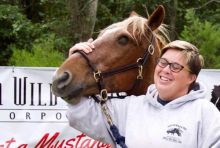
All across the Outer Banks are people doing their best to make a living while still finding time to enjoy this wonderful place they call home. In this edition of Get to Know a Local, you’ll meet one of them: Meg Puckett, director of herd management for Corolla Wild Horse Fund and resident of Kill Devil Hills.
Corolla Wild Horse Fund protects, conserves and manages the herd of about 100 Corolla wild horses (aka Bankers) that roam freely on the northernmost Currituck Outer Banks. The fund also manages the Betsy Dowdy Equine Center, a 31-acre rescue facility in Grandy where ill, injured or otherwise suffering wild horses are slowly domesticated to live at the center forever or be adopted. Currently the facility is home to 23 horses.
While being around the horses on the northern Outer Banks all day sounds like one of the most enviable Outer Banks jobs, as director of herd management, Puckett has a huge amount of responsibility that stretches beyond the 9 to 5 into evenings and weekends (which is probably why she says below that she sees both the sunrise and sunset every day). Managing the herd includes breed conservation, DNA testing, soil and plant studies, contraception darting, 24/7 emergency response, working with the veterinarian on medical issues, tracking relationships, record keeping, updating photos and more – and that's just with the wild horses. Puckett also works at the farm in Grandy to manage care, training, adoptions and events – plus she handles outreach and education as well as social media, PR and writing.
Keep reading to learn what it's like to be a manager of a herd of wild horses on the Outer Banks.
How long have you lived on the Outer Banks and how did you end up here?
I grew up in western Tidewater, and the Outer Banks was an extension of home for us. My family has owned a home here since the ’90s; I spent summers in college here, lived here off and on through my 20s, and then moved back down permanently about a decade ago. My whole family lives here permanently now.
What do you do for a living and how did you get into this line of work?
I manage the herd of wild Banker horses in Corolla (and their rescued/domesticated counterparts on the mainland). I’ve had horses my whole life, but just as important is my background with nonprofits, public education, writing and wildlife conservation and husbandry.
What did you do before you were in this business?
I’ve worked for nonprofits my entire career. Prior to moving back to the Outer Banks, I was at the Virginia Zoo in Norfolk and also worked at the Museum of the Albemarle in Elizabeth City. I’ve also done quite a bit of freelance writing over the years, but I don’t have much time for that anymore.
What motivates you to work hard in your line of work?
I try very hard not to take my work for granted. I talk to people just about every day who tell me that seeing the wild horses is on their bucket list, and it’s always a good reminder of just how lucky I am that this is my daily life. The biggest motivator for me will always be the horses, but the people who trust our organization to care for and protect the horses are also a huge motivator.
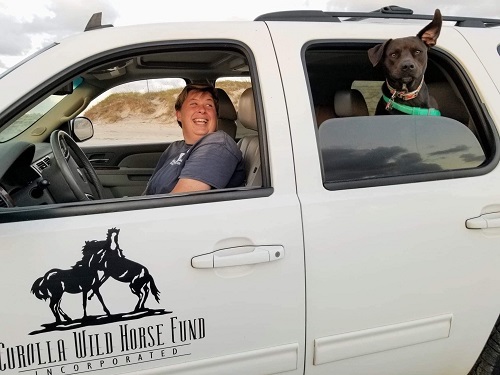
Puckett at work on the northernmost Currituck Outer Banks.
What’s your favorite thing about your job?
Seeing wild horses on the beach never, ever gets old.
What’s the most challenging part of your job?
Being responsible for the well-being of a large group of wild animals that you have very little actual control over can be very stressful. Anyone who tells you they don’t get attached is lying or in the wrong line of work. The trick is being able to compartmentalize and process that emotion so that it doesn’t interfere with appropriate management practices.
What’s your favorite OBX town or village?
I have very fond childhood memories of Duck when there wasn’t much there besides the campground and Winks. Nowadays I’d have to say my favorite place is the north beach, for obvious reasons.
What is your favorite thing about living on the Outer Banks?
I grew up in a small town, so the sense of community is very familiar and important to me. The history and natural beauty of the area is another big reason why I love the Outer Banks too.

A day at the office for Puckett.
What is your favorite season on the Outer Banks?
I love them all for different reasons. I’ve really become a fan of winter, which is not something I thought I’d ever say. I don’t love the cold, but January and February when it’s just so quiet and empty is really a special time. I love the horses’ fuzzy winter coats.
What do you do in the off-season?
My life doesn’t change all that much in the off-season. Believe it or not, horses don’t really understand the concept of relaxing for the winter. It’s busy in a different way than summer is, but there’s always something to do.
What’s your favorite beach access?
The end of the road in Corolla.
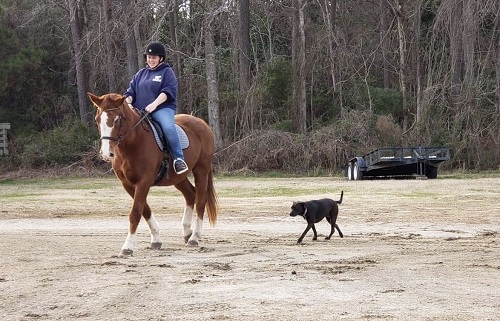
Puckett riding one of her own horses.
Describe your perfect day off.
Even though I’m around horses all day long for work, I don’t get much time to spend with my own horses. Work is work, even when you’re doing something you love. So it’s nice to spend time off the clock with my own ponies. My young horse is being trained under saddle right now, and I can’t wait to get him off the farm for beach and trail rides.
Do you see more sunrises or sunsets?
I usually see both every day. I like sunrise best in winter, and sunset best in summer.
What’s one thing you wish more Outer Banks visitors knew?
This isn’t just a vacation destination, and it’s not a resort that gets reset when you leave. We love sharing this place with people, but it’s so important for visitors to be respectful of the environment, wildlife and all of us who live and work here. Treat it like you would your own home!
Where do you go on vacation?
Vacations for me are always tied into visiting friends who live all over the country, so it’s usually less about the destination and more about who I’m going to see. It’s hard for me to leave town, so when I do I try to make it really worthwhile. But the great thing about living on the Outer Banks is that most of the time people are happy to come visit you, and it can be a lot of fun to be a tourist in your own town.
For a celebratory dinner, would you rather order take-out, go out to eat or cook something at home?
There are so many great restaurants here, I definitely prefer going out to eat. There’s nothing better than great food that I don’t have to cook or clean up after, and no dogs staring at me like they’re starving to death.
What is your favorite local seafood?
I’ll eat any kind of local seafood, but my favorites are oysters and tuna.
Do you have any side hustles?
No time for any!
Do you have any pet projects or is there a local nonprofit that you’re passionate about?
I’m a big supporter of Feline Hope and the work they do to care for our community cats.
What’s one item on your bucket list?
I would love to volunteer for Free the Bears at their sanctuary for sun and moon bears in Vietnam.
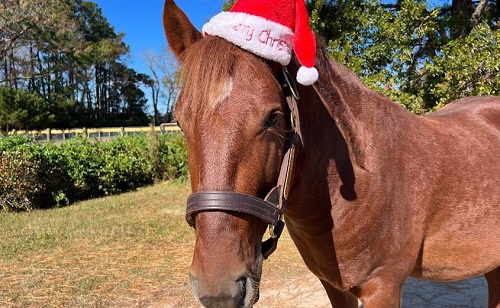
Meet Meg and Riptide
As one of her outreach duties, Meg will be at the Christmas in Corolla Village event on Saturday, November 25 from 4 to 6 p.m. With her will be Riptide, a four-year-old Banker stallion who was removed from the herd as a colt due to a serious infection requiring life-saving treatment. Meg will talk about the wild horses and the Corolla Wild Horse Fund's work to protect them. This event will take place at the CWHF Museum and Gift Shop at 1130-E Corolla Village Road.
Want to help the Corolla wild horses?
Corolla Wild Horse Fund is a nonprofit organization that always needs support and help. There are several ways you can help.
Shop the Gift Shop: You can purchase gifts in the online gift shop, with shipping or porch pickup available. Horse-related crafts, books, art and collectibles make great gifts. The fit shop will also be open during Christmas in Corolla Village on Friday, November 24 from 5 to 8 p.m. and Saturday, November 25 from 4 to 8 p.m. They will also be open weekend nights during the Christmas in Corolla Village events in December, with various times so call ahead: (252) 453-8002. 100 percent of profits go directly to management and care of the horses in the wild and at the rescue farm.
Sponsor a Horse: Sponsorship of a rescued Banker horse is a meaningful gift. Sponsors receive an embossed presentation folder, a color photo of the sponsored horse, an official certificate and background information on the sponsored horse.
Become a Member of CWHF: CWHF is a not-for-profit charity, and donations are tax-deductible. Annual memberships, gift memberships, sustaining memberships and patron membership information is available here.
Contribute to the CWHF Land Acquisition Fund: This fund allows supporters to donate toward the purchase, conversion to habitat and habitat maintenance of property that will be held in conservation in perpetuity for the horses. With the rate of development on the northern Outer Banks, the fund has identified land preservation as a dire need. Read more about this initiative and donate here.
Be Educated: Everyone can play a part in protecting the wild horses, by keeping their distance and never feeding the horses. You can find out a lot about keep the horses safe and help educate others here.
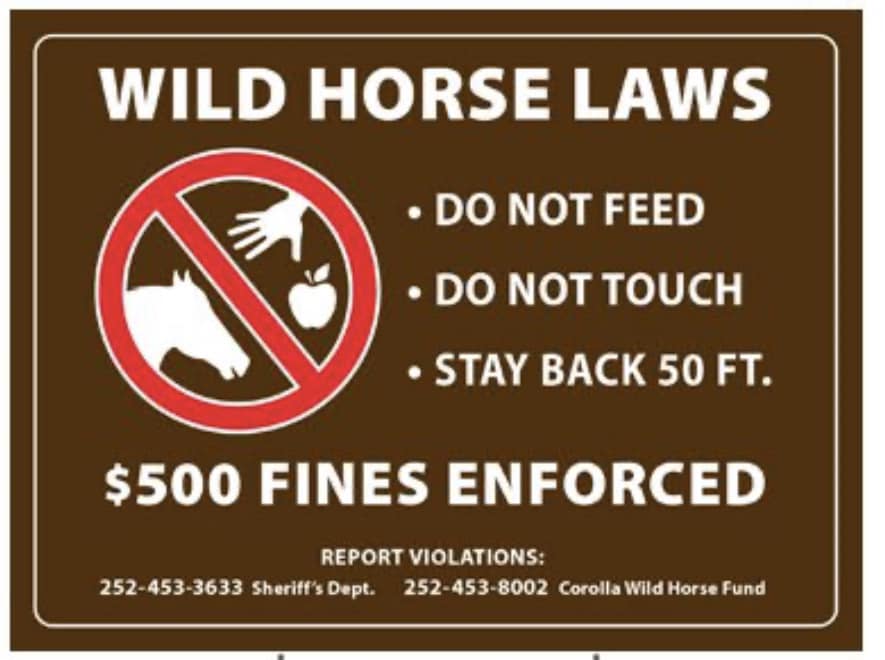

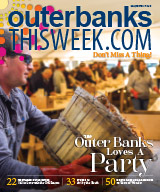
 Molly Harrison is managing editor at OneBoat, publisher of OuterBanksThisWeek.com. She moved to Nags Head in 1994 and since then has made her living writing articles and creating publications about the people, places and culture of the Outer Banks.
Molly Harrison is managing editor at OneBoat, publisher of OuterBanksThisWeek.com. She moved to Nags Head in 1994 and since then has made her living writing articles and creating publications about the people, places and culture of the Outer Banks.

